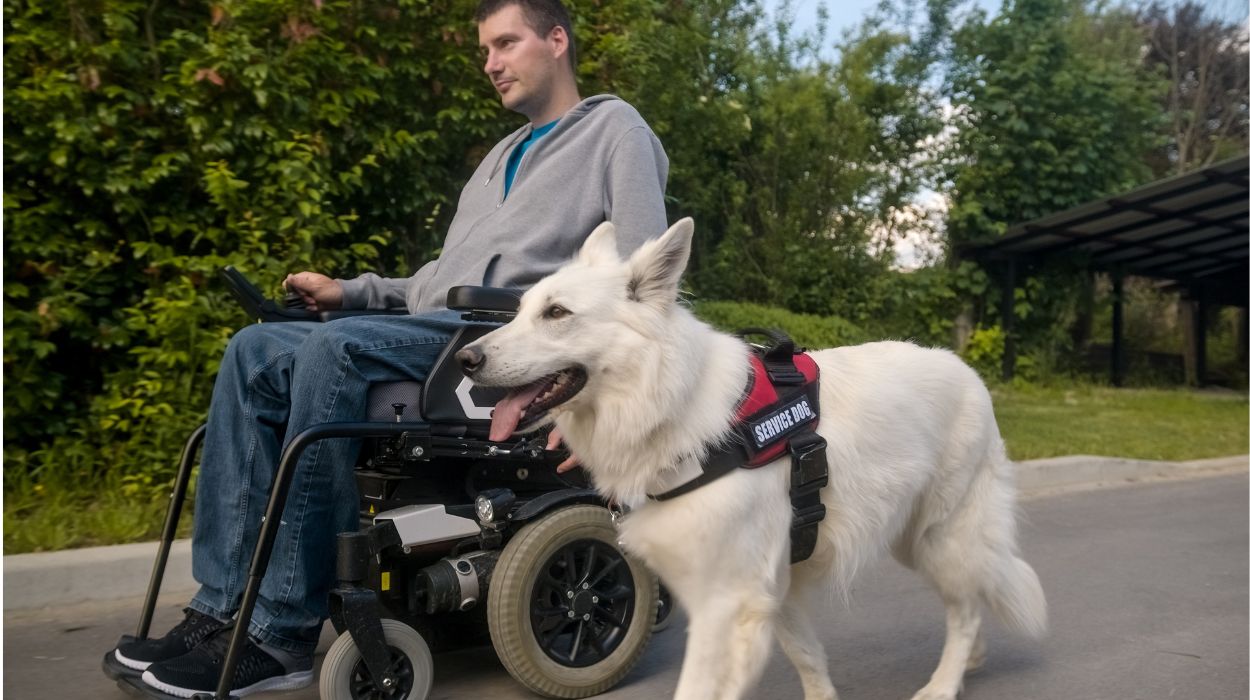 Evidence Based
Evidence Based
Evidence Based
This article is objectively based on relevant scientific literature, written by experienced medical writers, and fact-checked by a team of degreed medical experts.
Our team of registered dietitian nutritionists and licensed medical professionals seek to remain objective and unbiased while preserving the integrity of any scientific debate.
The articles contain evidence-based references from approved scientific sites. The numbers* in parentheses (*1,2,3) will take you to clickable links to our reputable sources.
Emotional Support Animal Kansas: Kansas Laws In 2024

Service animals are used in various settings, and there are laws in place to protect individual rights when traveling, visiting public spaces, finding a place to live, etc. Emotional support animals (ESAs) are similar but do not require the same training. An ESA can be helpful for individuals managing anxiety, depression, and other conditions.
How the law approaches emotional support animals can be a source of confusion. What are the state and federal laws, and how do they apply to specific settings? We will discuss these in more detail to help you better understand your rights.
Emotional Support Animals In Kansas: State Laws
There are no specific provisions for emotional support animals in Kansas state law.[1] This means federal laws apply, and there are several important laws to be aware of:
Emotional support dogs are most common in the language of the law, but other animals, such as cats, parrots, etc., are not excluded. Generally, the ADA does not require businesses or public spaces to allow ESAs. The FHA and ACAA do have provisions for emotional support animals.
Kansas State Laws For ESAs

Kansas law provides provisions only for service dogs or service animals that have been specially selected and individually trained for a specific task or tasks. Because the state law would regard emotional support animals as pets, the protections in place are defined by federal law. The relevant federal laws can be applied to the following situations:
Public Accommodation
Public places, including private businesses that sell food or other items, and public transportation would be best covered under the ADA. The ADA refers to ESAs as pets, which does not provide any protections against denial of services.
Unfortunately, this does mean that you can be denied service if you are bringing your emotional support animal into a place of business. There are many pet-friendly establishments in Kansas. These primarily cater to dog owners, however, so you may want to check with companies first if you are worried about more specific policies.
Housing
The Fair Housing Act provides protection for ESAs. These protections do allow landlords to require documentation if you request an accommodation for example, waiving a pet fee. A landlord can ask for disability-related information but cannot ask for more detailed medical records beyond a general recommendation provided by a healthcare professional.
Airline Travel
If you want to bring an ESA into the cabin area in an airplane, the staff can request documentation from a physician. The animal does not need to be a service animal. Individual airline policies vary. Some allow only dogs and cats; others allow rabbits and birds. A carrier or kennel may be required, so discussing this with the airline is helpful when planning your trip.
Emotional Support Animal (ESA): Vital Things To Know

If you already have multiple companion animals or are interested in getting an animal that could be helpful for support, it is essential to become familiar with the differences between service animals and emotional support animals.
Service Animals
A service animal, often a service dog, is defined as having completed training with a professional trainer to perform specific tasks that an individual would not be able to achieve on their own. Assistance with these tasks is considered a disability-related need.
A medical professional provides medical documentation confirming an individual’s disability and their need for an assistance animal. Examples of service animals include:
- Assistance Animal (Hearing Assistance Dogs, For Instance).
- Allergen Alert Animals.
- Guide Dog.
- Psychiatric Service Animals.
Emotional Support Animals
ESAs can be registered with a letter from a mental health professional such as a licensed therapist, but they do not require professional training. Because they are not specially trained, the law often regards comfort animals as pets.
Emotional support animal laws provide fewer public accommodations, but learning how to get an ESA letter can help improve the chances for a reasonable accommodation to be made. Unfortunately, there have been some scams offering fake letters.
This is frustrating for everyone with assistance animals because of the confusion it causes, making it more likely for someone with a legitimate need to be denied access to certain public places.
If you already have regular appointments with a mental health professional, the best way to ensure your ESA letter is accepted, is to request medical documentation directly. If you are not seeing a therapist, you can fill out a free screening form with a service like Certapet to know if you would be a good candidate.
Legitimate ESA services will always include visits with mental health professionals. These visits can be remote, but the provider should be licensed in your state. If you find a service that does not include a visit with a therapist, this is an indication that it may be a scam.
Can A Landlord Refuse An ESA In Kansas?
Housing providers in Kansas are required to provide reasonable accommodation for emotional support animals, as required by federal law in the Fair Housing Act. A landlord may require an ESA letter or similar documentation. If the landlord wants to deny accommodations, they are required to demonstrate:
- The ESA would cause property damage or pose a direct threat to the health or safety of other residents or neighbors.
- The ESA would cause the landlord to have to completely change the way they do business or would result in significant financial losses.
You do not need to prove that these things would not happen to request accommodations. If you feel that accommodations for your animal have been wrongfully denied and no solution can be reached after discussion, the Office of Fair Housing and Equal Opportunity (FHEO) can be contacted to file a complaint[5].
Places In Kansas To Take Your Emotional Support Animal
Many businesses allow pets while shopping or dining out. Pet stores are a great option, and many large home improvement stores allow pets, although this does vary by location. Most pet-friendly establishments specifically mention dogs, so if you do plan on bringing another furry friend, you may want to check first to make sure accommodations can be made.
Here are several examples of places where you can enjoy the company of your support animal while both of you are treated well:
Dodge City
- Dodge City Brewing
- Freddy’s Frozen Custard & Steakburgers
Garden City
- Garden City Dog Park
- El Patron Mexican Restaurant
- Patrick Dugan’s Coffee House
Leawood
- Three Dog Bakery
Olathe
- Johnny’s BBQ
- Gary L. Haller Trail
Topeka
- Big Shunga Park
- Lake Shawnee
- Kaw River State Park
- Kansas Museum of History Nature Trails
Wichita
- Chisholm Creek Pet Resort Pup Park
- Pracht Wetlands Park
- Starlite Drive-In
- Kansas Aviation Museum
Conclusion
Our pets can be an essential part of our lives, and emotional support animals provide much-needed comfort while managing depression, anxiety, post-traumatic stress disorder, or other conditions. These animals can benefit your well-being despite not being specially trained as service animals.
Unfortunately, in Kansas, you can be denied service at an establishment with a “no pets” policy. It can be helpful to obtain an ESA letter from a mental health professional, however, as this may help you request housing accommodations or make travel more comfortable.
If you decide to get an ESA letter, ensure a reputable source provides it – this does need to come from a professional like a licensed therapist!
Frequently Asked Questions
Title I of the ADA deals specifically with employment. The ADA refers to service animals as having specific training for specific tasks. If you want to bring an ESA to work, this would not be protected under the law.
Emotional support animals can provide significant benefits to individuals managing mental health conditions such as anxiety, depression, and post-traumatic stress disorder.
Yes, emotional support animals can provide comfort and support to individuals experiencing panic attacks. Their presence and calming influence can help alleviate anxiety and reduce the severity of panic attack symptoms.
While there is no official identification card for emotional support animals, having documentation such as an ESA letter from a qualified mental health professional is advisable. This letter serves as proof of your need for an emotional support animal and can be helpful in certain situations.
Under the Americans with Disabilities Act (ADA), a qualified individual is someone who has a recognized disability and is entitled to the protections and accommodations provided by the ADA. In the context of emotional support animals, a qualified individual refers to someone who has a diagnosed mental health condition that substantially limits their daily activities.
+ 5 sources
Health Canal avoids using tertiary references. We have strict sourcing guidelines and rely on peer-reviewed studies, academic researches from medical associations and institutions. To ensure the accuracy of articles in Health Canal, you can read more about the editorial process here
- Kslegislature.org. (2023). Statute | Kansas State Legislature. [online] Available at: http://www.kslegislature.org/li/b2023_24/statute/039_000_0000_chapter/.
- ADA.gov. (2023). The Americans with Disabilities Act. [online] Available at: https://www.ada.gov/.
- www.hud.gov. (n.d.). FHEO Home | HUD.gov / U.S. Department of Housing and Urban Development (HUD). [online] Available at: https://www.hud.gov/program_offices/fair_housing_equal_opp.
- Transportation.gov. (2022). Passengers with Disabilities | US Department of Transportation. [online] Available at: https://www.transportation.gov/airconsumer/passengers-disabilities.
- HUD.gov / U.S. Department of Housing and Urban Development (HUD). (n.d.). File a Complaint – Main Page. [online] Available at: https://www.hud.gov/fairhousing/fileacomplaint.



